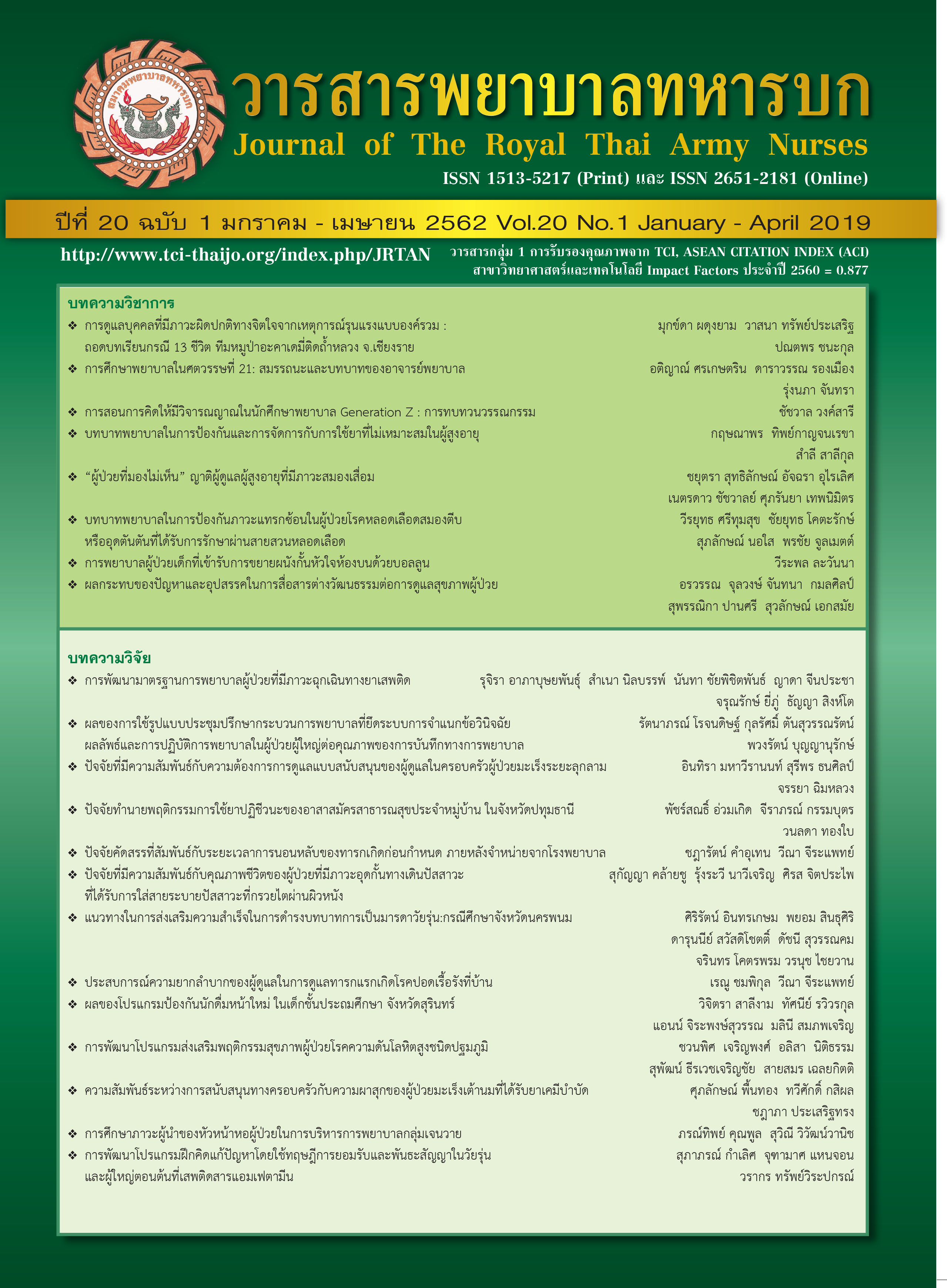The Relationship between Perceived Benefits of Pre-practice Preparation and Clinical Practice in Normal Labour Care of Nursing Students
Keywords:
Preparation, Clinical Practice in Normal Labour CareAbstract
This cross-sectional survey study aimed to assess the relationship between the perceived benefits of pre practice preparation and self-assessment in normal labour care practices of nursing students. Fourth year nursing students-2016 academic year-of two nursing colleges, located in Bangkok and vicinity areas, under jurisdiction of Praboromarajanok Institute were recruited into the study. The total number of the samples was 192. Self-administered questionnaire consisting of personal information, perceived benefits of pre-practice preparation, and normal labour care practice self-assessment was used for data collection. The instrument was validated by three relavant experts and field-tested for reliability which yielded Chronbach’s alpha of 0.92, 0.97. Descriptive statistics and Pearson’s correlation were used for data analysis. Results showed that the samples perceived the benefits of the pre-practice preparation at good level and rated most of their labour care practices as good. It was found that the perceived benefits of pre-practice preparation were moderately and positively related to self-assessment labour care practices. Results of this study can be used to guide the improvement of the pre-practice preparation program to enhance analytical thinking and skills among the students to reinforce their confidence in providing effective labour care in the clinic.
Downloads
References
Rungnoci N, Srisawang J. Effects of Selfimprovement on intensive care knowledge and skills of nursing students. Journal of Phrapokklao Nursing College. 2016; 27 (2): 29-38. (in Thai)
Cheaplamp S, Ampon K, Boonchuayruea P. Effects of Pre-clinical practice preparedness on knowledge and skills in critical care of nursing students, Phrapokklao Nursing College, Chanthaburi. Journal of Phrapokklao Nursing College. Journal of Phrapokklao Nursing College. 2015.; 26 (2). (in Thai)
Becker M.H. The health Belief Model and personal health behavior. New Jersy: Slack. Thorofare. 1974.
Gerdprasert S, Phumonsakul S. Nursing students’ and nursing instructors’ opinions towards teaching-learning methods used in midwifery laboratory prior to labour care practice. Rama Nurs J. 2013. (in Thai).
Lertsakornsiri M, Deoisres W, Suwaree S. Factors Associated with the Performance of Clinical Practice in Obstetrics Nursing Among Nursing Students in Private Institutions. Journal of Nursing Science & Health .2012; 35 (2). (in Thai).
Cohen J . A power primer.Psychological Bulletin. 1992; 112(1)115-159
Jamjang S, et.al. Effects of Using Simulation-Based Learning for Preparation of Nursing Practicum on Perceptions of Self Efficacy in Performing
Care in a Hospital.Nursing. Journal of the Ministry of Public Health. 2017; 27: 46-58. (in Thai)
McCallum, J. The debate in favour of using simulation education in preregistration adult nursing. Nurse Education Today. 2007; 27(8), 825–831.
Lambton, J., O’Neill, S. P., & Dudum, T.Simulation as a strategy to teach clinical pediatrics within nursing curriculum. Clinical Simulation in Nursing. 2008; 4(3), e79-e87.
Lerdsakornsiri M. Stress and coping with stress of nursing students during labour care practices. Kuakarun Journal of Nursing. 2015; 22 (1): 7-16.
(in Thai).
Lertsakornsiri M. The Relationships between Personal Factors, Environment Factors and Stress, Stress Management during Practice in Labor Room of Nursing Students at Saint Louis College. Journal of The Royal Thai Army Nurses. 2014; 15 (2): 270-279. (in Thai).
Downloads
Published
How to Cite
Issue
Section
License
บทความหรือข้อคิดเห็นใดใดที่ปรากฏในวารสารพยาบาลทหารบกเป็นวรรณกรรมของผู้เขียน ซึ่งบรรณาธิการหรือสมาคมพยาบาลทหารบก ไม่จำเป็นต้องเห็นด้วย
บทความที่ได้รับการตีพิมพ์เป็นลิขสิทธิ์ของวารสารพยาบาลทหารบก
The ideas and opinions expressed in the Journal of The Royal Thai Army Nurses are those of the authors and not necessarily those
of the editor or Royal Thai Army Nurses Association.






